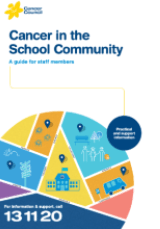- Home
- About Cancer
- Schools and teachers
- Cancer in the school community
- Talking about cancer in schools
- Communicating with people of all ages
Communicating with people of all ages
A person’s understanding of cancer depends on their age, maturity level and experience with the disease. When someone they know is diagnosed with cancer, they may have a range of reactions. These reactions depend on their relationship with the person, their personality and temperament, and the support they receive.
Recognising different perspectives
See Different views of cancer for an outline of how children, adolescents and adults without cancer may understand the disease, how they might react to someone’s cancer diagnosis, and how you can talk to them about it. Key treatment or testing milestones, including finishing treatment, can also prompt anxiety.
Observing behavioral changes
Be particularly alert for changes in behaviour. For example, a young child may regress to thumb-sucking, a sociable student may start to withdraw from peers, a top student’s grades may start to slip, or an even-tempered teacher may become moody. You can use these behavioural changes as a starting point for a supportive conversation. Provide opportunities for professional counselling if needed. Your school counsellor should be able to help.
Remember that each person is unique and these are broad guidelines. Although the experience of cancer is often challenging, many people are resilient and have positive reactions. For example, siblings of children with cancer often grow in compassion and empathy for the hardship of others.
Educational Resources for Children
Cancer words for kids provides definitions for some cancer-related words. It provides two versions of each definition: one that is suitable for younger children, and one that is more appropriate for older children, adolescents and adults.
Our information on Talking to Kids About Cancer may help you with strategies for discussing cancer with students from different age groups. Camp Quality offer a free educational program, which uses puppets to help preschool and primary school students understand and talk about cancer.
→ READ MORE: Different views of cancer
Podcast: Explaining Cancer to Kids
Listen to more episodes from our podcast for people affected by cancer
More resources
Claire Tobin, Principal Medical Advisor, Department of Education and Training, VIC; Dr Antoinette Anazodo, Paediatric and Adolescent Oncologist, Sydney Children’s Hospital and Prince of Wales Hospital, Director of The Sydney Youth Cancer Service, and Conjoint Senior Researcher, University of New South Wales, NSW; Lisa Barrow, Clinical Nurse Educator, Children’s Cancer Centre, Royal Children’s Hospital, Melbourne, VIC; Margo Bulic, Psychosocial Support Worker, CanTeen, ACT; Amber Copeland, 13 11 20 Consultant, Cancer Council Queensland; Donna Drew, Clinical Nurse Consultant, Paediatric Oncology/Palliative Care, Kids Cancer Centre, Sydney Children’s Hospital, Randwick, NSW; Allesha Fecondo, Education Consultant, Victorian Paediatric Rehabilitation Service, and Education Liaison, Ronald McDonald Learning Program, Ronald McDonald House Charities Australia, VIC; John Friedsam, General Manager of Divisions, CanTeen Australia, NSW; Pina Hutcheson, President, Catholic Primary Principals’ Association of WA; Cara Irvine, Year 8 Coordinator, Alfred Deakin High School, ACT; Andrew Long, Assistant Director, Policy and Research, Independent Schools Council of Australia, ACT; Dr Alistair Lum, Post-doctoral Research Fellow – Behavioural Sciences Unit, Sydney Children’s Hospital, University of New South Wales, NSW; Kristine Luszczynski, Learning Program Manager, Quality and Standards, Ronald McDonald House Charities Australia, NSW; Anita Neville, National Manager, Ronald McDonald Learning Program, Ronald McDonald House Charities Australia, VIC; NSW Department of Education, NSW; Mandy Roney, Consumer; Shannon Rush, Primary School Program Manager, Camp Quality, SA; Luke Wade, Education and Career Support Consultant, Redkite, QLD.
View the Cancer Council NSW editorial policy.
View all publications or call 13 11 20 for free printed copies.
Need to talk?
Support services
Coping with cancer?
Speak to a health professional or to someone who has been there, or find a support group or forum
Looking for transport, accommodation or home help?
Practical advice and support during and after treatment
Cancer information
What is cancer?
How cancer starts and spreads
Dealing with the diagnosis
Common reactions to a cancer diagnosis and how to find hope


